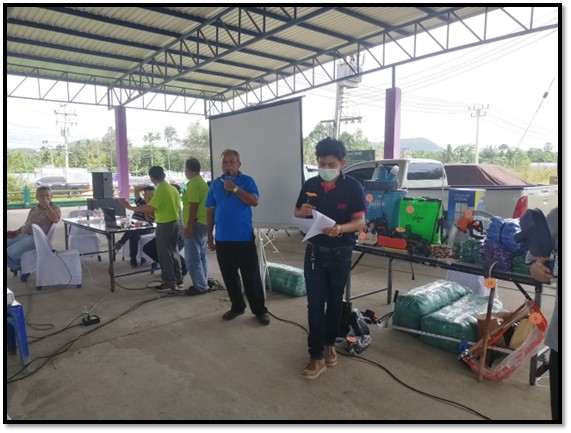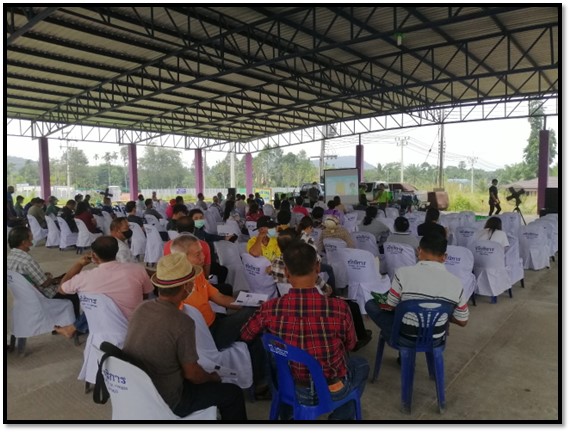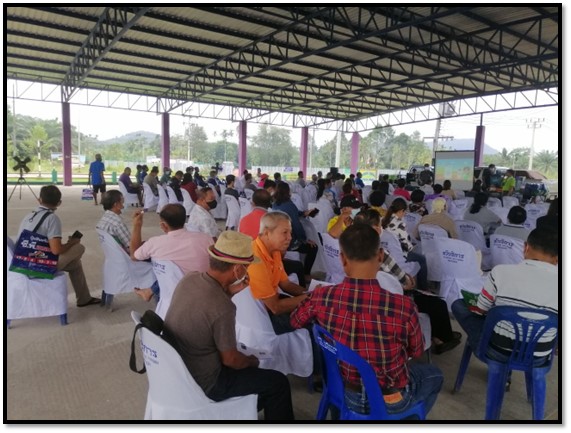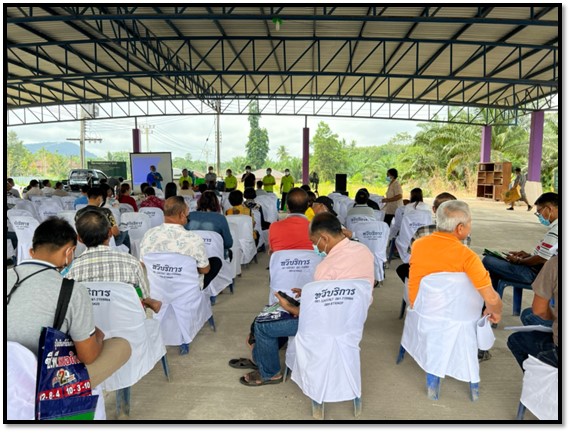
About the group
Number of smallholders: 403 (246 Men, 157 Women)
Total Land Area: 2502 Ha
Status: Certified
Group location: 30 Moo. 4 Saikueng sub-district, Phra Saeng district, Surat Thani province 84210
Country: Thailand
On-going Facilitator: Thai Talow and Oil Co., LTD.
SUSTAINABILITY JOURNEY STORY
“Palm growers must not have losses. They can enhance the lifespan of their palm trees and reduce losses by properly applying fertilisers and complying with RSPO Standards. Joining RSPO is worthwhile for farmers as they spend less money on fertilisers, which results in improved living conditions.”
Mr. Somjet Loetkrai
Manager of Saikhueng Bangsawan Community Enterprise Group
……
“Earlier, each farmer focused on their own farming practices and relied on information from fertiliser vendors or high-yielding oil palm farms. Despite the many complicating factors of palm cultivation, farmers did not attend any courses or follow international standards,” began Somjet Loetkrai, Group Manager of Saikhueng Bangsawan Community Enterprise, explaining the group’s background story.
“After the group was formed, members reaped significant benefits from higher selling prices compared to prices obtained by non-certified farmers. Once they become RSPO Members, farmers get premium rates with an additional 10–20 satang more per sales unit. In addition, farmers are instructed on farm management practices such as palm-cutting techniques to make high-grade palms and proper fertiliser application.
“The group’s initiative on sustainable oil palm farming has had numerous positive effects. Members have improved farm management methods that can be adapted to their farms. They learn how to maximise yields, sell at higher prices, interact with one another and share information. Even farmers who worked together did not have clear guidelines about farm practices before. Whatever anyone suggested, they just accepted on faith.”
Somjet also shared, “After being certified by RSPO, communities surrounding the palm farms recognised positive social and economic impacts. Social benefits include greater collaboration through group meetings and trainings. This is in contrast to the past when farmers worked independently and barely interacted. Farmers used to come to the factories to sell oil palms and did not have much conversation. Now farmers and factories communicate and support each other. In economic terms, farmers sell their palms at premium prices and have lowered their fertiliser costs.”
The Group Manager added, “The group has initiated social support by providing welfare to members. If a member’s relative passes away, the group will render support by joining the funeral ceremony and making religious merit. During traditional activities, such as the Kratin religious ceremony at the temples, the group will send members to provide necessities to help their fellow members.
“As for environmental initiatives, the group has requested trees from forestry organisations so members can also grow other economic crops, such as ironwood or mahogany, on palm plantations. When the palm tree’s life span ends, there will be some remaining trees on the farm, so more green areas and water sources can be maintained. Members also learn about the proper use of chemicals to eliminate adverse impacts on the wider community, and ways to handle used containers to comply with RSPO Standards.”
When asked about supporting partners, Somjet replied, “Thai Tallow and Oil Co., Ltd assisted in the formation of the group and sent three mentors to provide guidance to members. They assisted in developing a database system, farm profiles, member registration, productivity data and other evaluation forms. They act as an intermediary between factories and members and provide huge support in many areas, especially with trainings. They sometimes invite external speakers to conduct trainings and provide resources such as water, electricity and transportation.”
As for RSPO tools like the High Conservation Value (HCV) application, Somjet said, “We tried to use that application but there were signal problems in the rural areas. There is no signal at some plots because they are located in the mountains. We rarely use mobile phones and lately started to use GPS more for navigation, less for communication.”
Regarding challenges faced by the group in shifting toward sustainable palm cultivation, Somjet shared, “Most of the farmers are elderly. During the early palm plantation period, farmers learned by word of mouth from vendors and peers. They were unfamiliar with Nitrogen Phosphorus Potassium (NPK) fertiliser, English and technical terminology. We had to explain things several times. It was similar to teaching young students step by step.
“Another problem related to RSPO is that some requirements are not applicable to our country. The most recent version of RSPO Standards is more detailed, rigorous and complex, yet the results remain the same. For instance, the ban on using fire to clear forests or waste poses an issue. To use fire, permission is only gained through several steps. Farmers have to do extra work as a result.”
When asked about planning for the next year and the five-year goals for sustainable palm production, Somjet said, “The group aims to increase membership by 30–50 members each year. But we have not set clear goals for palm productivity since it depends on many unpredictable factors such as rain. For now, the focus remains on increasing membership.”
On the biggest changes that came with shifting to sustainable palm plantations, Somjet highlighted, “Members are more knowledgeable about farm management. They used to ask vendors how to apply fertilisers, but now farmers have developed their own methods and are more aware of the nutritional needs of palm trees.
“Another change is the emphasis on economic sustainability. Palm growers must not have losses. They can enhance the lifespan of their palm trees and reduce losses by properly applying fertilisers and complying with RSPO Standards. Joining RSPO is worthwhile for farmers as they spend less money on fertilisers, which results in improved living conditions.”
When asked what the key is to ensure the smallholder group continues to be certified long-term, Somjet responded, “The ability to comply with requirements can help the group prosper further. I’m used to working in groups. Some groups bring villagers together without having a mediator. After operating the group for a while, some members may get different ideas that may cause the group to start splitting. Consequently, it’s important to have a strong mediator with experience and clear ideas on how to manage groups.”
Asked about specific approaches used to coordinate with smallholders, Somjet said, “Understanding farmers is key. It is necessary to convey RSPO information in simple language so the farmers become acquainted with, and understand, what is presented. Some of the younger smallholders use modern technology while others are elderly and do not take so quickly to it. Communication with the younger generation is not difficult while it can be challenging with older individuals. Early on, we had many meetings but now that things are settled, we have fewer meetings, maybe just two to three a year. Members cooperate well at meetings. They notify the group in advance if they are engaged in an urgent matter. The group ground rules state that a member can be absent no more than three out of every 10 meetings.”
When asked about the key factor in maintaining the group’s sustainable palm oil practices, Somjet stated, “Premium pricing is the key motivation. Members recognise the value and experience the increase of their earnings. This is the primary means through which the group will survive. The premium price is 20 satang higher. The regular price at the Oil Palm Bunch Collection Centre varies a little from day to day. Using THB 5.50 as an example, if we sell to contracted mills the selling price will be THB 5.70.”
Somjet summarised, “To support the group of smallholders to become RSPO Certified, they must first have good intentions. Second, they have to be landowners. Third, smallholders must commit to learning from the group. Fourth, they must adopt all of the learning into their practices. Finally, they must agree to follow the group’s principles, such as meeting attendance or cooperating with mentors who visit their farms.
“Members currently diversify crops on the oil palm farm to earn other income. During the immature stage of the palms, farmers may grow rice or other short-lived crops such as corn and vegetables that provide a yield within the year. Nowadays, due to the tough economy, farmers are growing other crops more. Any future impact is uncertain because when the palm trees mature, we cannot grow those short-lived crops.”
Finally, when asked about key challenges following RSPO Certification, the Group Manager responded, “The main challenge is how to maintain RSPO Certification, due to changing requirements that can affect how successfully we retain members over time. Nonetheless, premium prices and ongoing interaction with members to make them feel they are not abandoned are also critical to the group’s success.”
Project Impact
Total area covered by the project
2502 Ha
Number of smallholders benefitting from this project
403 Smallholders
Number/percentage of women supported by this project
38.96% women in this project
How you can support
Our group is interested in supporting farmers and mentors with portable soil testing tools or equipment. These tools would enable them to test soil values on the spot and notify members immediately of the results. Currently, the group has to send soil samples for inspection at the Land Development Center, which is located in Kanchanadit District, Surat Thani Province.
GROUP CONTACT
Representative Contact
Somjet Loetkrai | Group Manager | [email protected] |
Surin Choosri
Group Chairman
(+66) 77 277 200
[email protected]
IMAGE GALLERY

Saikueng Bangsawan Community Enterprise Group

Saikueng Bangsawan Community Enterprise Group

Saikueng Bangsawan Community Enterprise Group

Saikueng Bangsawan Community Enterprise Group

Saikueng Bangsawan Community Enterprise Group

Saikueng Bangsawan Community Enterprise Group




